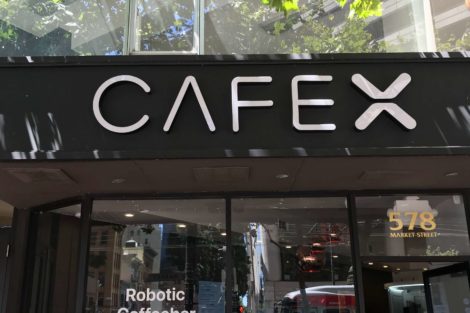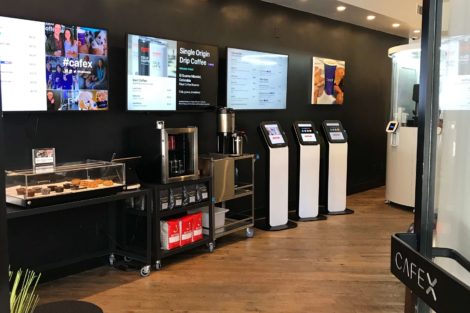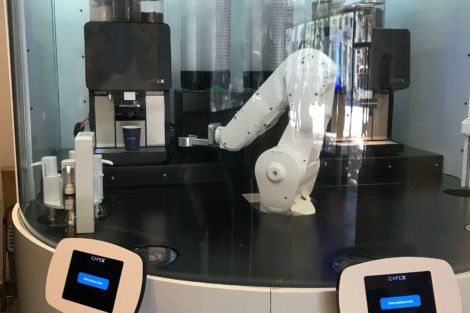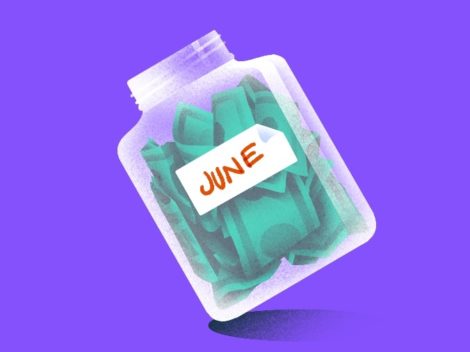Making coffee—whether you do it in your kitchen at 6:30 AM or by a hip barista behind the counter of your favorite corner cafe—is a process which requires a human touch, even when a machine does most of the work.
Follow Crunchbase News on Twitter
But what little humans still do to make coffee is up for automation if Cafe X Technologies (also known as “Cafe X”) has its way. Cafe X’s spartan locations in San Francisco are equipped with at least one coffee-making robot—including an arm that can move on six axes costing $25,000—and an array of tablet computers where customers place orders and pay.
Recent regulatory filings suggest that Cafe X is slurping down up to $12 million. The company’s CEO, Henry Hu, confirmed with Crunchbase News that Cafe X is raising a “Seed-1” round led by Jason Calacanis and Craft Ventures.
The paperwork, submitted last week, shows that Cafe X Technologies has already raised $9.42 million out of a $12.01 million venture funding round. At the time of filing, 26 investors have committed capital in this round, and that number is likely to grow as the company fills out the rest of the deal.
On the SEC filing, three people are listed as board members of the company:
- Henry Hu, the 24 -year-old founder and CEO of Cafe X who financed initial development with a $100,000 grant he received as a Thiel Fellow.
- Cynthia Yeung, Cafe X’s chief operating officer, who joined the company in 2018 after serving as a product evangelist for SoftBank Robotics America.
- Jason Calacanis, a Silicon Valley investor, entrepreneur, and commentator who was among the first outside investors in the company.
Hu said that, for now, there will be no changes to Cafe X’s board.
Apart from Calacanis, the company’s prior investors include the Thiel Foundation, Social Capital, Khosla Ventures, and Felicis Ventures, among others.
According to Crunchbase data at time of writing, the company has raised a total of $5.1 million in venture funding over two prior rounds, the last of which was a seed round announced in January 2017. (For the record, a recent CNBC article about Cafe X pegs the company’s total funding at $7 million.) Cafe X currently operates three locations in San Francisco, including one on Market Street, close to Crunchbase News’s San Francisco bureau.
As part of reporting this story, we sent our Editor in Chief, Alex Wilhelm, to fetch a beverage from that particular location. He ordered an espresso and paid $3. After placing his order, he watched as a robot made his drink and was prompted to enter a confirmation number. Upon successfully entering the “pickup code,” the machine conveyed his cup to an elevator, which lowered his drink into a little vestibule with a door that slid open to reveal his beverage.
There was an attendant on duty to explain the process to new customers. To order a pastry, Wilhelm was directed to another human employee. Wilhelm gave the espresso a “B/B+” grade.
Holden Page, an editor at Crunchbase News, recently visited the Market Street location. For what it cost, he said it wasn’t very good, and “the experience was no faster than a barista.”
For its part, Cafe X told CNBC that its robot system can produce 120 drinks per hour—roughly two per minute—when running at full throttle. Crunchbase News spoke with a senior shift supervisor at a Starbucks in Chicago. She said that one well-trained human barista can make up to three drinks per minute, or 180 per hour. After a week or two on the job, she said new hires can do two per minute.
At least in its current configuration, Cafe X’s robotic barista technology is unlikely to be faster than a decent human worker. But a robot can faithfully reproduce a recipe with mechanical exactitude, and it can log and retrieve customer preferences with ease. But is that really what most people look for when they go buy a cup of coffee?
Maybe, at least once. But therein lies the bigger question. Cafe X and other food robotics companies are beginning to explore what happens when machines replace humans in the food service business. What’s not yet clear, though, is whether a bot-driven shop can attract loyal customers in the same way human-staffed coffee shops already have. For now, they seem to be novelties for the curious few who try them.
This post has been updated to reflect new information shared by Henry Hu. We confirmed that this was an extension of the company’s seed round, the lead investors, and that there were no plans to change the board structure.

Stay up to date with recent funding rounds, acquisitions, and more with the Crunchbase Daily.






![Illustration of a guy watering plants with a blocked hose - Global [Dom Guzman]](https://news.crunchbase.com/wp-content/uploads/quarterly-global-3-300x168.jpg)
67.1K Followers